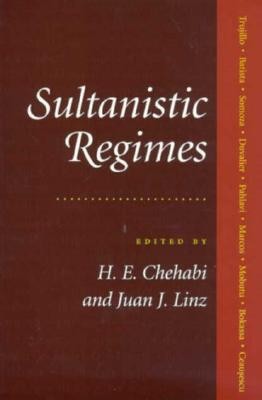
- We will send in 10–14 business days.
- Publisher: Johns Hopkins University Press
- ISBN-10: 0801856949
- ISBN-13: 9780801856945
- Format: 15.3 x 22.9 x 1.7 cm, softcover
- Language: English
- SAVE -10% with code: EXTRA
Sultanistic Regimes (e-book) (used book) | bookbook.eu
Reviews
Description
Sultanistic regimes, as Juan Linz describes them, are authoritarian regimes based on personal ideology and personal favor to maintain the autocrat in power; there is little ideological basis for the rule except personal power. This volume of essays studies important sultantistic regimes in the Domanican Republic, Cuba, Haiti, Iran, and the Philippines. Part one contains two comparative essays, which discuss common characteristics of sultanistic regimes, compare them to totalitarian and authoritarian regimes, and trace common patterns for these regimes' rise and fall. Chehabi and Linz argue that sultanistic regimes do not offer favorable transitions to democracy, no matter what the person in power says. Part two applies Linz's model to country studies.
EXTRA 10 % discount with code: EXTRA
The promotion ends in 18d.08:58:43
The discount code is valid when purchasing from 10 €. Discounts do not stack.
- Publisher: Johns Hopkins University Press
- ISBN-10: 0801856949
- ISBN-13: 9780801856945
- Format: 15.3 x 22.9 x 1.7 cm, softcover
- Language: English English
Sultanistic regimes, as Juan Linz describes them, are authoritarian regimes based on personal ideology and personal favor to maintain the autocrat in power; there is little ideological basis for the rule except personal power. This volume of essays studies important sultantistic regimes in the Domanican Republic, Cuba, Haiti, Iran, and the Philippines. Part one contains two comparative essays, which discuss common characteristics of sultanistic regimes, compare them to totalitarian and authoritarian regimes, and trace common patterns for these regimes' rise and fall. Chehabi and Linz argue that sultanistic regimes do not offer favorable transitions to democracy, no matter what the person in power says. Part two applies Linz's model to country studies.


Reviews